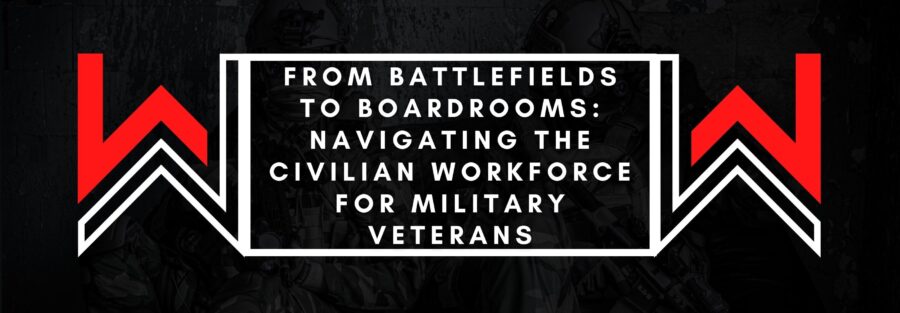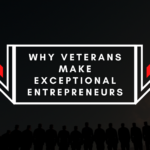From Battlefields to Boardrooms: Navigating the Civilian Workforce for Military Veterans
Veterans entering the civilian workforce after serving in the military face unique challenges, including recognition of their skills and experience, difficulty in translating their military background to civilian terms, and potential health concerns. It’s important for both veterans and employers to be aware of these challenges and to have access to resources and initiatives to support a successful transition.
Providing assistance to veterans entering the workforce benefits not only the individual veterans, but also the companies and communities they join, as they bring valuable skills and experiences to the workplace.
Military veterans bring a unique set of skills and experiences to the civilian workforce, making them valuable contributors to the job market. Some of the key strengths they bring include:
-
Leadership: Veterans have often served in leadership roles and have honed their skills in decision-making, conflict resolution, and teamwork.
-
Adaptability: Veterans have experience adapting to new situations and environments, making them well-suited for jobs that require flexibility and the ability to handle change.
-
Discipline: Veterans are used to a structured and disciplined lifestyle, making them responsible and dependable employees.
-
Technical Skills: Many veterans have received specialized training in their military careers that can translate to valuable technical skills in the civilian workplace.
-
Diverse Backgrounds: Veterans come from diverse backgrounds and bring unique perspectives to the workplace, helping to foster a more inclusive and innovative work environment.
These strengths, along with a strong work ethic and commitment to mission, make veterans valuable additions to any workplace.
By providing opportunities and resources to help military veterans transition to civilian careers, employers can not only help support those who have served our country, but also enhance the diversity and capabilities of their own workforce.
Military veterans are not only valuable assets to the traditional workforce, but also bring unique qualities to the world of entrepreneurship and business. With their leadership skills, adaptability, discipline, and technical know-how, veterans have the potential to become successful business owners and entrepreneurs.
The entrepreneurial spirit is often inherent in military veterans, as they are used to taking initiative and making decisions in high-pressure environments. Many veterans also have a strong desire to take control of their own career paths and financial futures, making entrepreneurship an attractive option.
For veterans looking to start their own business, there are numerous resources and initiatives available to support their transition from military to entrepreneur. These resources range from mentorship programs and business incubators to access to funding and networking opportunities.
By fostering an environment that supports military veteran entrepreneurs, we not only help those who have served our country achieve their goals, but also provide a boost to the economy through the creation of new businesses. In today’s business landscape, there is a growing recognition of the importance of diversity, and military veteran entrepreneurs bring a unique set of experiences and perspectives to the table.
So, whether they are entering the traditional workforce or pursuing entrepreneurship, military veterans have much to offer and should be fully supported in their career endeavors. By integrating military veterans, entrepreneurship, and business, we can help create a more dynamic and inclusive job market for all.
The Challenges Facing Military Veterans in the Workforce
Military veterans face a range of challenges as they transition from military to civilian life, particularly in the workforce. These challenges include:
-
Lack of recognition of military skills and experience: One of the biggest challenges faced by military veterans is the lack of recognition of their skills and experiences. Many employers are not familiar with the unique qualifications that military service can provide, making it difficult for veterans to get their foot in the door for civilian jobs.
-
Difficulty in translating military experience to civilian terms: Another challenge faced by veterans is the difficulty in translating their military experience to civilian terms. Military jargon and specific technical skills may not be easily understood by civilian employers, making it difficult for veterans to effectively communicate their qualifications.
-
Mental and physical health concerns: Many veterans return from military service with physical and mental health challenges, including post-traumatic stress disorder (PTSD), traumatic brain injury (TBI), and chronic pain. These conditions can impact their ability to work and may pose barriers to finding employment.
It’s important for both employers and veterans to be aware of these challenges and to have access to resources and initiatives to help mitigate them. By providing support and resources for veterans to build civilian job skills, access to mental health services, and outreach and education for employers, we can help military veterans successfully transition to civilian life and the workforce.
Ultimately, by addressing these challenges, we can support military veterans in their pursuit of fulfilling careers and improve the overall quality of the workforce. By working together, we can help ensure that military veterans receive the recognition, support, and opportunities they deserve.
Solutions for Veterans and Employers
There are several solutions available for both veterans and employers to help address the challenges faced by military veterans in the workforce. These solutions include:
-
Government programs and initiatives: The government offers several programs and initiatives to support veterans in finding work. These include the Department of Veterans Affairs’ Vocational Rehabilitation and Employment program, which provides veterans with training, education, and job search assistance, and the Veterans Affairs’ Veterans Employment Verification program, which helps employers verify a veteran’s military service and determine their eligibility for certain benefits.
-
Corporate initiatives to support and hire military veterans: Many corporations have recognized the value of military veterans in the workforce and have implemented initiatives to support and hire veterans. These initiatives can include veteran hiring programs, mentorship and training opportunities, and networking events.
-
Resources for veterans to build civilian job skills and network with employers: There are also numerous resources available for veterans to build their civilian job skills and network with potential employers. These resources include online training and education programs, job search platforms specifically for veterans, and veterans’ organizations that provide job search assistance, mentorship, and networking opportunities.
By utilizing these solutions, veterans can receive the support they need to effectively transition to civilian life and the workforce, while employers can benefit from the valuable skills and experiences that military veterans bring to the table.
In conclusion, supporting military veterans in their transition to the civilian workforce is a collective responsibility. By working together, veterans, employers, and the government can create a supportive environment that recognizes the unique contributions and needs of military veterans and helps ensure their success in the civilian workforce.
Success Stories and Inspiring Quotes from Military Veterans
- Success Story: Chris Marvin, a former Army helicopter pilot, started the nonprofit organization Leader dogs for Veterans, which provides guide dogs to disabled veterans. Chris says, “The military taught me to lead, but my guide dog gave me back my independence.”
Inspiring Quote: “The true soldier fights not because he hates what is in front of him, but because he loves what is behind him.” – G.K. Chesterton
- Success Story: Eric Greitens, a former Navy SEAL, went on to become the governor of Missouri and the founder of The Mission Continues, a nonprofit organization that empowers veterans to continue their service through community impact projects. Eric says, “Leadership is not about being in charge. It’s about taking care of those in your charge.”
Inspiring Quote: “A true leader has the confidence to stand alone, the courage to make tough decisions, and the compassion to listen to the needs of others.” – Douglas MacArthur
- Success Story: Shoshana Johnson, a former Army cook, became the first African American woman to be taken as a prisoner of war in U.S. history during Operation Iraqi Freedom. She later went on to become a motivational speaker and advocate for veterans’ rights. Shoshana says, “No matter what challenges you face, don’t give up. You have the strength and the determination to overcome them.”
Inspiring Quote: “The soldier above all others prays for peace, for it is the soldier who must suffer and bear the deepest wounds and scars of war.” – Douglas MacArthur
These success stories and inspiring quotes from military veterans highlight the positive impact that veterans can have in the workplace. Despite the challenges they face, military veterans bring unique skills, experiences, and perspectives to the table that can drive success in a wide range of industries. By supporting veterans in their transition to civilian life and the workforce, we can help ensure their continued success and contribution to society.
In conclusion, supporting military veterans in the workforce is crucial for both veterans and employers. Veterans bring valuable skills, experiences, and perspectives to the table that can drive success in a wide range of industries. However, veterans also face unique challenges in transitioning from military to civilian life and the workforce.
To address these challenges, there are numerous resources and initiatives available, including government programs, corporate initiatives, and resources for veterans to build their civilian job skills and network with potential employers. By taking advantage of these resources and initiatives, both veterans and employers can ensure a successful transition and maximize the positive impact that military veterans can have in the workplace.
In short, supporting military veterans in the workforce is not only the right thing to do, but it is also essential for the success and growth of individuals, businesses, and society as a whole. Let us work together to make this transition as smooth and successful as possible for our military heroes.
References & Mentions:
-
Leader Dogs for Veterans. (n.d.). About Us. Retrieved February 5, 2023, from https://www.leaderdog.org/about-us
-
The Mission Continues. (n.d.). About Us. Retrieved February 5, 2023, from https://www.missioncontinues.org/about-us/
-
Shoshana Johnson. (n.d.). Keynote Speaker. Retrieved February 5, 2023, from https://shoshanajohnson.com/
-
U.S. Department of Labor. (n.d.). Veterans’ Employment and Training Services. Retrieved February 5, 2023, from https://www.dol.gov/vets
-
Department of Veterans Affairs. (n.d.). Benefits & Services for Veterans. Retrieved February 5, 2023, from https://www.va.gov/
-
Corporate America Supports You. (n.d.). About Us. Retrieved February 5, 2023, from https://www.casys.org/
-
Military.com. (n.d.). Career & Education. Retrieved February 5, 2023, from https://www.military.com/veteran-jobs/career-education.html
Our fellow patrons will receive access to receive tons of helpful things like:
- How to analyze a company and its’ financials to determine whether it’s a good investment
- Exclusive Invite Only Scripts and Coding for TradingView that I use personally and for my hedge fund!
- Fundamental Education & Resources
- Technical Education & Resources
- Weekly Mentorship w/ Lessons (Valued $25,000+)
- Free eBooks and Courses along with other Valuable Resources (Valued $10,000+)
- Access to Q&A’s Daily along with Nightly Sessions
- Learn How to Read the Charts and Candles
- Learn How to Use Technical Analysis
- Learn How to Read Financial Documents
- Random Prizes!
- Network with Others like you!
- And so much more!






